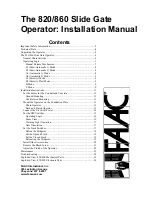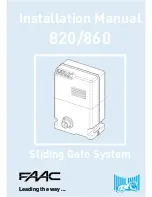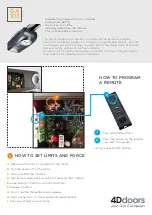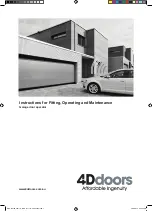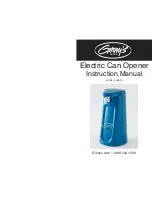
English –
15
English
TESTING AND COMMISSIONING
––– STEP 9 –––
Maintenance must be performed in strict observance of the safety
provisions in this manual and according to current legislation and
standards.
The automation devices do not require special maintenance. However a
check should be performed at least every six months to ensure complete
efficiency of all devices.
For this purpose, the tests and checks envisaged in paragraph 8.1 “Test-
ing” should all be performed, as well as all procedure in the paragraph
“Maintenance operations permitted for the user”.
If other devices are present, follow the instructions in the relative mainte-
nance schedule.no manutenzione.
MAINTENANCE
solutions adopted, manufacturer’s declaration of conformity for all
devices used (use appendix 1).
02.
Affix a dataplate on the door, specifying at least the following data:
type of automation, name and address of manufacturer (responsible
for commissioning), serial number, year of construction and CE mark.
03.
Permanently attach to the gate the label supplied in the pack, regard-
ing the procedure for manual locking/release of the gearmotor.
04.
Compile and provide the automation owner with the declaration of
conformity (use appendix 2)
05.
Prepare and provide the automation owner with the User’s guide; for
this purpose appendix 3 “User’s guide” may be used as an example
(chapter 11.3).
06.
Prepare and provide the owner with the form “Maintenance sched-
ule”, containing all maintenance instructions for all devices in the
automation
07.
Before commissioning the automation, ensure that the owner is ade-
quately informed of all associated risks and hazards.
This product is an integral part of the automation and therefore must
be disposed together with the latter.
As in installation, also at the end of product lifetime, the disassembly and
scrapping operations must be performed by qualified personnel.
This product is made of various types of material, some of which can be
recycled while others must be scrapped. Seek information on the recy-
cling and disposal systems envisaged by the local regulations in your area
for this product category.
Caution!
– some parts of the product may contain pollutant or hazardous
substances which, if disposed of into the environment, may cause serious
damage to the environment or physical health.
As indicated by the symbol alongside, disposal of this
product in domestic waste is strictly prohibited. Separate
the waste into categories for disposal, according to the
methods envisaged by current legislation in your area, or
return the product to the retailer when purchasing a new
version.
Caution!
– Local legislation may envisage serious fines in the event of
abusive disposal of this product.
PRODUCT DISPOSAL
––– STEP 8 –––
These are the most important phases when setting up an automation, in
order to guarantee maximum safety.
Testing can also be used as a periodic check of devices in the automa-
tion.
Testing of the entire system must be performed by skilled and quali-
fied personnel, who are responsible for the tests required to verify
the solutions adopted according to the risks present, and for ensur-
ing observance of all legal provisions, standards and regulations,
with particular reference to all requirements of the standard EN
12445 which establishes the test methods for testing automations
for power-operated gates.
8.1
- TESTING
01.
Ensure that all instructions and warnings in STEP 1 have been
strictly observed.
02.
Using the selector or radio transmitter, test a gate closing and open-
ing cycle and ensure that the leaf movement corresponds to specifi-
cations. A number of tests should be performed to ensure that the
gate moves smoothly and that there are no assembly defects, incor-
rect settings, or any points of friction.
03.
Check operation of all system safety devices one at a time (photo-
cells, sensitive edges, etc.). In particular, each time a device trips, the
“ECSBus” led on the control unit emits a longer flash to confirm con-
trol unit recognition of the event.
04.
To test photocells and in particular that there is no interference with
other devices, pass a cylinder (
fig. 36
) (diameter 5 cm, length 30 cm)
through the optic axis, first close to the TX and then the RX and then
mid-way between the two. Ensure that in all cases the device
engages, changing from the active status to alarm status and vice
versa; then ensure that the action envisaged is performed on the
control unit: during closure inverts movement.
05.
Measure the force as specified in the standard EN 12445. If the
motor force control is used as an auxiliary function for reduction of
impact force, test and identify the setting that obtains the best
results.
8.2
- COMMISSIONING
Commissioning can only be performed after positive results of all
test phases. Partial or “makeshift” commissioning is strictly prohibit-
ed.
01.
Produce the technical documentation of the automation, which must
include at least the following documents: overall layout drawing (e.g.
fig. 3
), electrical wiring diagram (e.g.
fig
.
24
), risk assessment and
36
Содержание WG10SK
Страница 2: ......
Страница 7: ...English 5 English 2 3 4 5 GRAPH 2 1 B F D C A G E maximum leaf length m Maximum leaf weight kg...
Страница 10: ...8 English English 8 9 11 12 13 14 15 10...
Страница 11: ...English 9 English 16 17 18 19 20 B A C D E F G H 21 22 23...
Страница 13: ...English 11 English 30 A B 6 mm x4 A B A B A B B B B 1 2 3 4 1 2 3 4 5 29 6 B C A D E F...
Страница 14: ...12 English English 30 A B A B A B A B A B A B 5 6 7 8 9 11 12 10 A B A B 6 mm x4 A A A A 4...
Страница 16: ...14 English English 31 A B 32 A C B 33 35 A B A B 34 T1 T2 T3 T4...
Страница 34: ......
Страница 35: ......































